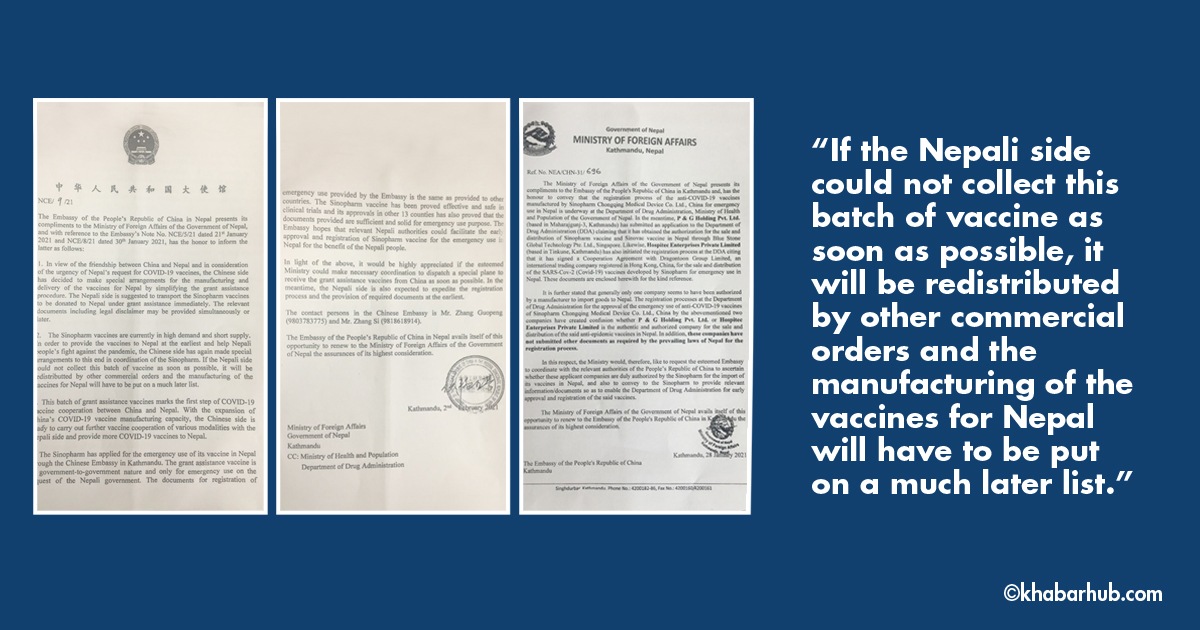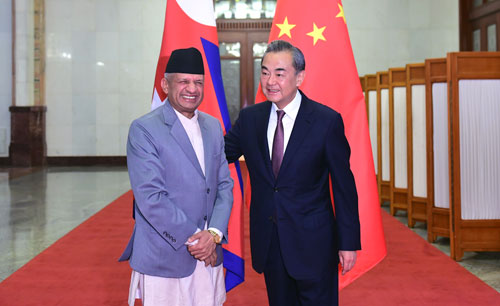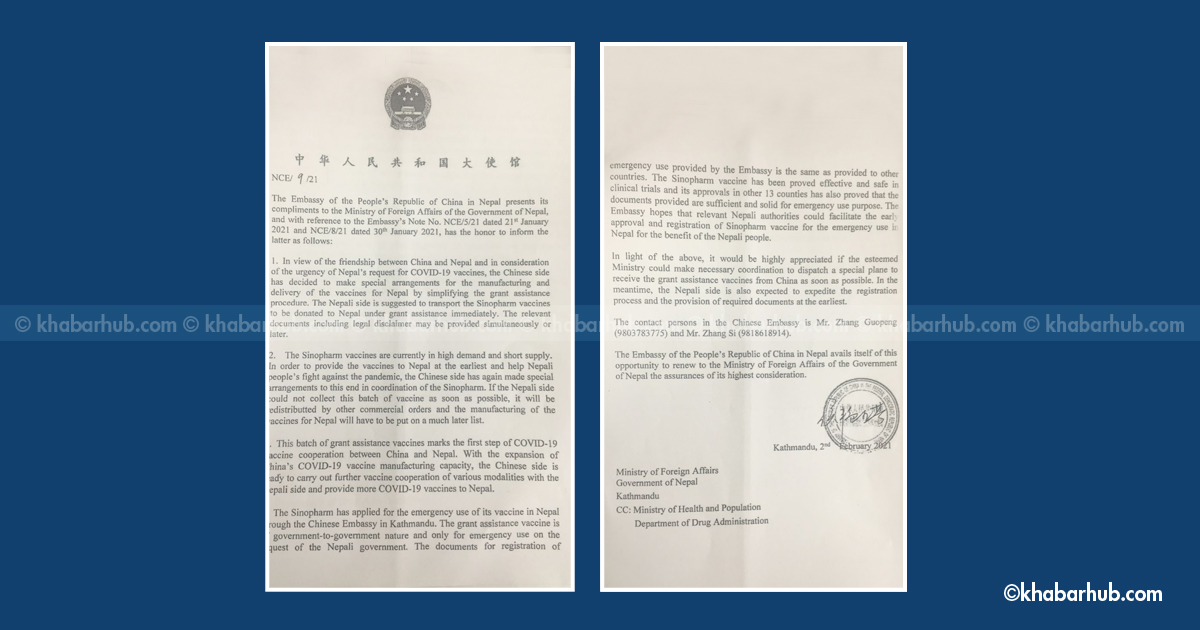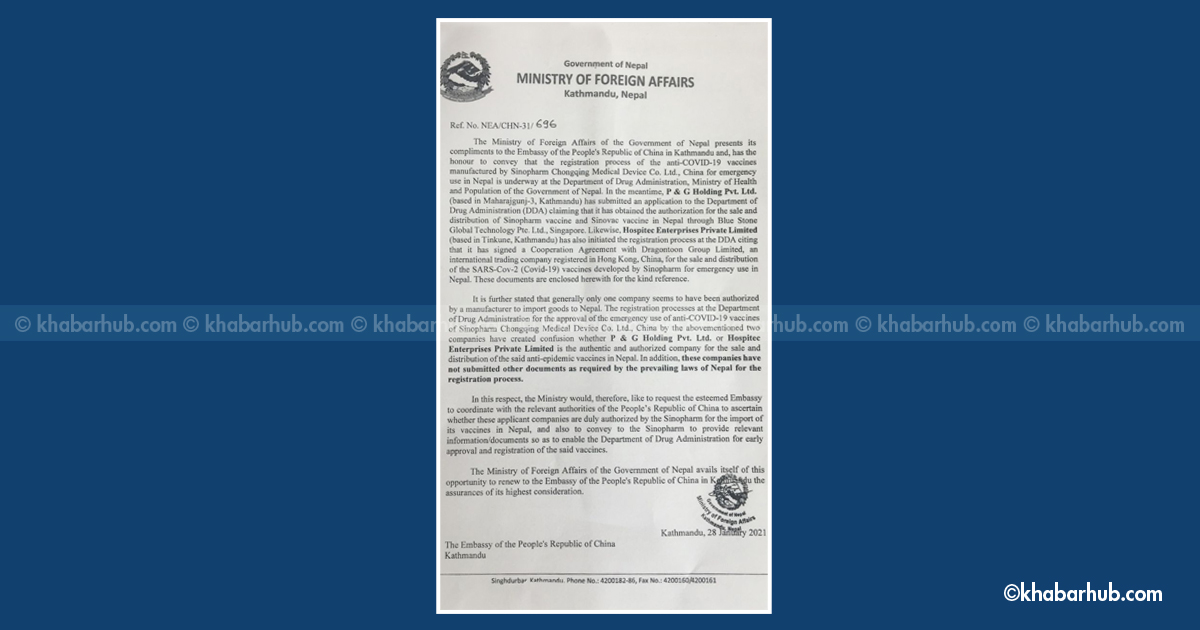0%

KATHMANDU: Despite Nepal’s concern about the efficiency and effectiveness of the Chinese vaccines against COVID-19 assured to be provided to the government, the Chinese side has been mounting pressure against the government through various channels and now overtly.
Chinese Foreign Minister Wang Yi held a telephone conversation with his Nepali counterpart on Friday and put pressure to accept the vaccines first under the condition that the details about the vaccines will be sent afterward; a topsy-turvy way of vaccine procurement.
“Necessary documents will be provided later, but take the vaccine immediately,” the letter the Chinese side has sent to the Nepal government with the warning tone that otherwise the country may need to wait quite long to get the vaccine.” Khabarhub has obtained a copy of the letter.

With the Government of Nepal raising concern about Chinese supplies of vaccine to Nepal, China has warned Nepal to transport the Sinopharm vaccines immediately and that the relevant documents, including the legal disclaimer, may be provided simultaneously or later.
The Chinese side has warned Nepal saying that if the government of Nepal fails to collect the vaccine as soon as possible, it will be re-distributed by other commercial orders and the manufacturing of the vaccines for Nepal will have to be put on a much later list.
Earlier, the Nepali side had sent a letter to the Chinese Embassy in Nepal saying that the company supplying the vaccine had not provided the required documents.
The Embassy was asked to clarify that two Chinese companies had sought permission to supply vaccines to Nepal and had not completed the process.
The P&G Holdings Pvt Ltd and Hospice Enterprises Pvt Ltd had applied for permission to supply Chinese vaccines to Nepal.
The Ministry of Foreign Affairs has stated that there is a dilemma as to which company is the official company for importing vaccines.
Nepal has been promised two million COVID vaccines by India and another two million vaccines by the United Kingdom.
The letter further states: “If the Nepali side could not collect this batch of the vaccine as soon as possible, it will be redistributed by other commercial orders and the manufacturing of the vaccines for Nepal will have to be put on a much later list.”
The P&G Holdings has sought permission from the Department of Drug Administration with a price list, to supply the vaccine through Blue Stone Global Technology Pvt Ltd, a Singaporean company. However,
The P&G has not provided the required documents for vaccine supply. So far, the Department of Drug Administration has only allowed conditional emergency use of Covishield produced by the Serum Institute of India.
There is a provision that the Department of Drug Administration should give permission after studying whether the vaccine is suitable for use before bringing it.
However, the Nepali government has not given permission for the use of Chinese vaccines.
The Chinese Embassy in Nepal has sent a reply to the Ministry of Foreign Affairs’ (MoFA) letter in a cautioning language.

China warns Nepal to either take the COVID-19 vaccine now or might get it never!
Although the tone seems soothing in the beginning, the letter turns stronger later. The letter sent to MoFA said, “Emphasizing the friendship between China and Nepal and Nepal’s demand for COVID-19 vaccines, the Chinese side has decided to make special arrangements for the production and delivery of vaccines for Nepal by simplifying the grant aid process.”
The letter has suggested taking the Sinopharm vaccine immediately to donate to the Nepali side under grant assistance and has remarked that the supply may become very difficult.
“Supply is becoming very difficult due to high demand of Sinopharm vaccines,” the letter highlights the urgency of taking it instantly urging the government to take it instantly.
China, in the letter, said that the Nepali side is suggested to transport the Sinopharm vaccines to be donated to Nepal under grant assistance immediately.
“The relevant documents including legal disclaimer may be provided simultaneously or later,” the letter said adding, “The Sinopharm vaccines are currently in high demand and short supply. In order to provide the vaccines to Nepal at the earliest and help Nepali people’s fight against the pandemic, the Chinese side has again made arrangements to this end in the coordination of the Sinopharm.”
The letter further states: “If the Nepali side could not collect this batch of the vaccine as soon as possible, it will be redistributed by other commercial orders and the manufacturing of the vaccines for Nepal will have to be put on a much later list.”
“The Embassy hopes that relevant Nepali authorities could facilitate the early approval and registration of Sinopharm vaccine for the emergency use in Nepal for the benefit of the Nepali people,” the letter stated.
Meanwhile, when asked about the issue, the Foreign Ministry Assistant Spokesperson Suresh Adhikari said that he had no information on the matter requested to consult the spokesperson.
However, when Spokesperson Sewa Lamsal was contacted she replied she did not know about the letter and requested to call after some time but she was not available for contact afterward.
On January 31, the Chinese Embassy in Nepal stated that it would provide 300,000 doses of Sinovac vaccine produced by its own state-owned company Sinoform to Nepal.
However, according to the Foreign Minister’s statement on Friday, during a telephone conversation between Foreign Minister Pradeep Kumar Gyawali and Chinese Foreign Minister, China agreed to increase the quantity and expressed its commitment to provide 500,000 doses of vaccine.

No permission from the Department of Drug Administration
There is a provision that the Department of Drug Administration has to give permission after studying whether any vaccine is suitable for use before it is brought for use in Nepal. However, the government has not given formal permission for the use of Chinese vaccines.
According to Santosh KC, Information Officer at the Department of Drug Management, only Covi-shield produced by the Serum Institute of India has been allowed for conditional emergency use so far.
“We have so far allowed the Covi-shield produced by the Serum Institute of India for conditional emergency use,” Information Official KC told Khabarhub, “Apart from that, no one else has got permission so far.”
Ganesh Srivastav, the Joint Spokesperson of the Ministry of Health also expressed ignorance about the Chinese vaccine being brought to Nepal but he added that prior approval is a must.
“No vaccine should be used without approval,” Srivastav told while speaking to Khabarhub, “We study about the vaccines before granting permission for use and do not let anything being used without approval.”
Concerns about the effectiveness of Chinese vaccine
Even though China will provide the vaccine, there are fears about the Chinese vaccine from different countries of the world. The third phase of the Sino-vac vaccine, developed by Chinese company Sinopharm was found only 50.4 percent effective in Brazil.
Citing that the vaccine developed by Oxford is 70 percent effective and the vaccine developed by Pfizer and Moderna is 95 percent effective, the western countries are expressing concerns about the usefulness of the Chinese vaccine as it is found only 50 percent effective.
“Whether it is from China or any other company, the success rate should be considered first,” Samir Mani Dixit, a public health expert, told Khabarhub, “One should not heed the pressure, the vaccine should be brought to use only after verifying the details.”
Experts suggest that hasty vaccination without verifying the success statistics could have a more negative impact on public health.